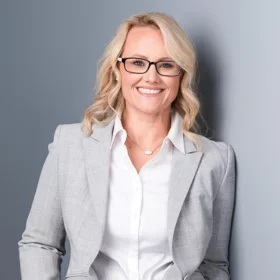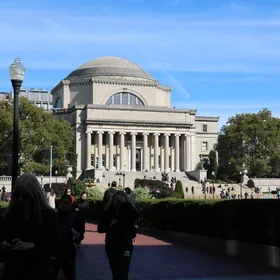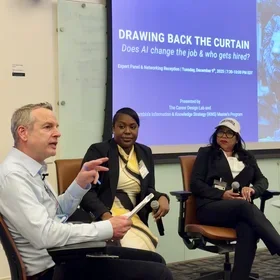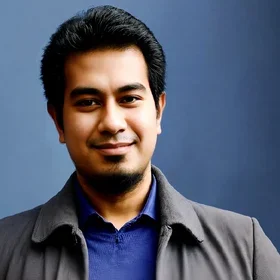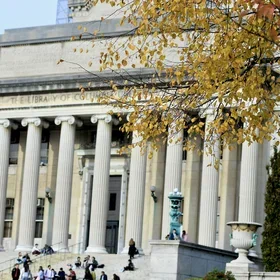AI at Columbia SPS
Columbia University School of Professional Studies (SPS) is the place to develop and apply AI skills in a comprehensive, responsible way while advancing your educational and professional goals. At SPS, you will study the theory, technologies, applications, deployments, and measurements associated with AI—a complete and comprehensive skill set necessary for a modern world.
Artificial intelligence (AI) is impacting just about every industry and role today. To ensure that graduates are equipped to use AI tools and lead change in their sectors effectively, courses across the School’s academic programs are constantly being updated to reflect the changing technological landscape and are refined through the expertise of scholars actively engaged in developing and implementing AI tools.
“AI is here and its potential is vast,” said SPS Senior Associate Dean of Academic Affairs Erik Nelson. “Understanding and applying AI is a required skill in the modern world. SPS is the ideal place to develop those skills.”
World-Class Scholar-Practitioner Faculty and Highly Specialized Curricula
SPS’s scholar-practitioner faculty model—applied across all programs—offers students the opportunity to learn from and work alongside lecturers with extensive real-world experience in their fields. Faculty members come from companies that are leading the charge on AI, including OpenAI, Google, Amazon, IBM, Healthfirst, Morgan Stanley, New York Life, and Johnson & Johnson. These experts bring in-depth industry knowledge to classroom learning through their course design, case studies, guest lectures, site visits, and culminating projects with real-life or simulated clients.
In addition to incorporating AI into standard course curricula, each semester a number of AI-specific courses are also offered. These courses span the School’s many programs and include Ethical AI in Human Rights, Social Justice, and Conflict Resolution (within the Negotiation and Conflict Resolution program); AI and the Knowledge-Driven Organization (within the Information & Knowledge Systems program); AI/ML for Leaders (Technology Management); Data, Technology and AI in Insurance (Insurance Management); and Applied Deep Learning and AI (Applied Analytics).
AI is here and its potential is vast. Understanding and applying AI is a required skill in the modern world. SPS is the ideal place to develop those skills. — SPS Senior Associate Dean of Academic Affairs Erik Nelson.
Javid Huseynov, an associate professor of professional practice in Applied Analytics whose résumé includes experience at IBM; ESPN, the Walt Disney Company; Mine Safety Appliances, Inc.; and Conexant Systems, teaches a variety of data- and AI-focused courses. One such class is AI User Interfaces for Analytics, which blends conceptual learning and practice assignments to develop effective user interfaces (UI) and design user experience (UX) using AI tools.
According to Kitty Kay Chan, director of the Applied Analytics program, “AI has long been a part of the Applied Analytics programs curriculum as analytics is the foundation that empowers AI systems to learn and act intelligently. Applied data analytics skills enable our students to stay relevant in a world where AI is redefining how organizations operate, compete and innovate.”
An alumnus from the Information & Knowledge Strategy (IKNS) program, Chris Reitz, put his SPS education to use and is now senior director of artificial intelligence at Elevance Health. He remains active within SPS, supporting the AI and the Knowledge-Driven Organization course, which teaches basic applications of AI, how they work, and when they are appropriate. The course is geared toward leaders and project managers in knowledge-driven organizations.
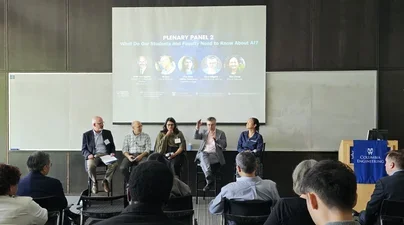
Dean Troy Eggers moderating the panel, "What Do Our Students and Faculty Need to Know About AI?" at a 2025 Columbia AI retreat.
“IKNS is focused on people collaborating with and managing information and knowledge assets. The program teaches strategy across disciplines, which promises to remain valuable in this era of AI,” said Reitz. “IKNS is also this really nice platform for collecting mental models to inform different directions one can take a career—product management, technology-related roles, and analytics broadly speaking—and it certainly fed my appetite for understanding more about artificial intelligence.”
AI applications are wide-reaching and go beyond traditionally tech-focused disciplines. Gregory J. Wawro, director of the Political Analytics program, applies quantitative analysis in his research and teaches a course titled Data Science for Political Analytics. In his class, students learn how to use AI to tackle data and coding challenges.
“The course is designed to teach students to learn how to learn, as assignments push them to extend specific skills discussed into new territory,” Wawro explained, emphasizing the use of Stack Overflow and ChatGPT in assignments. He stressed responsible use and practical application, noting, “It is important for students to learn how to use these resources while respecting academic integrity and intellectual property rights,” and adding that “an important aspect of teaching students to learn to use AI resources is recognizing its limits.”
Integrating AI to Support Individual Professional Development
When used thoughtfully and responsibly, AI is an invaluable tool that can benefit not only students but the University, too. One such use is in helping administrators respond more efficiently to student needs. Within the award-winning Career Design Lab (CDL), AI is used to help students with interview preparation and practice, as well as offering skills assessments and resume refinement.
“Immediately, we realized the power and potential of AI,” said Diane Spizzirro, executive director of the CDL. “And we rapidly moved to operationalize to better help our students.”
One resource available through the CDL is SPS Talent, a data-driven recruitment platform powered by 12Twenty to connect SPS students and alumni with potential employers and companies. Various AI-led resources are also available on a subscription basis for students, such as ThinkCell, a data visualization tool which helps users quickly create compelling charts, improve PowerPoint slides, and automate regular reports.
As SPS Senior Associate Dean for Academic Affairs Erik Nelson notes, “Integrating AI into higher education programs ensures that students graduate not only with theoretical knowledge, but with practical, industry-relevant expertise that mirrors the evolving demands of the job market."
The combination of accomplished faculty, University resources, a talented student body, and the progressive approach of leadership make SPS uniquely equipped to prepare students for careers in an AI-driven world.
Columbia University AI Initiatives and Research
SPS operates within the context and environment of Columbia University, where students benefit from access to world-class research and resources. There are numerous University-wide opportunities, events, workshops and seminars through which to engage in the latest conversations on AI. Recent events include “AI and Longevity: Reshaping Education and Human Potential” and “Beyond Chatbot: How GenAI Can Unlock Real Business Value.” SPS students collaborate with peers across campus, in the School of Arts and Sciences, the Data Science Institute (DSI), Teachers College, and the Business School to name a few.
The recently concluded “Columbia AI Summit” brought together panelists who discussed a wide range of topics concerning AI and its uses, from free will and creativity to cancer care and the climate crisis. The summit was just one showcase of the University’s collective efforts, thought leadership, renowned research, provocative discussions, and diverse set of projects and applications. Garud Iyengar, DSI director and co-leader of the University's AI initiatives said: "Few universities in the world have Columbia’s breadth and depth of expertise."
Growing Alongside AI
By learning to work with AI, SPS graduates will be prepared to adapt with the times. Shahryar Shaghaghi, program director of the M.S. in Technology Management program and Professor of Professional Practice for the Enterprise Risk Management program—who has worked as CTO for Quantum Xchange, head of IT risk management at Citigroup, and an advisor on cybersecurity for the Federal Reserve Bank of New York—noted that even in an increasingly AI-reliant field like consulting, the human component “remains irreplaceable.”
“Successful consultants embrace AI as a multiplier of their capabilities,” Shaghaghi said. “Much as Excel revolutionized financial modeling in the 1990s and data science reshaped analytics in the 2010s, today’s AI tools are reshaping consulting’s future. Those who adapt will lead. And those who pair technical fluency with empathy, ethics, and critical thinking will become the most trusted advisors.
As David Romoff, a lecturer in the Enterprise Risk Management program, notes: “It is beneficial and appropriate that students’ abilities without AI grow as they continue to be guided by AI. With guidance, better writing with AI should lead to better writing without AI; better coding with AI should lead to better coding; even better brainstorming and critical thinking with AI should lead to better thinking without AI.”
About the School
The Columbia University School of Professional Studies (SPS) was founded in 2002 with a mission to provide innovative—and flexible—programs that help students reach their educational and professional goals. The School offers 18 accredited master’s degrees, 15 certificate and certification programs, and more than 100 areas of study through its Postbaccalaureate Studies and Visiting Students programs. All SPS programs offer a part-time option, and many programs are also available online.
